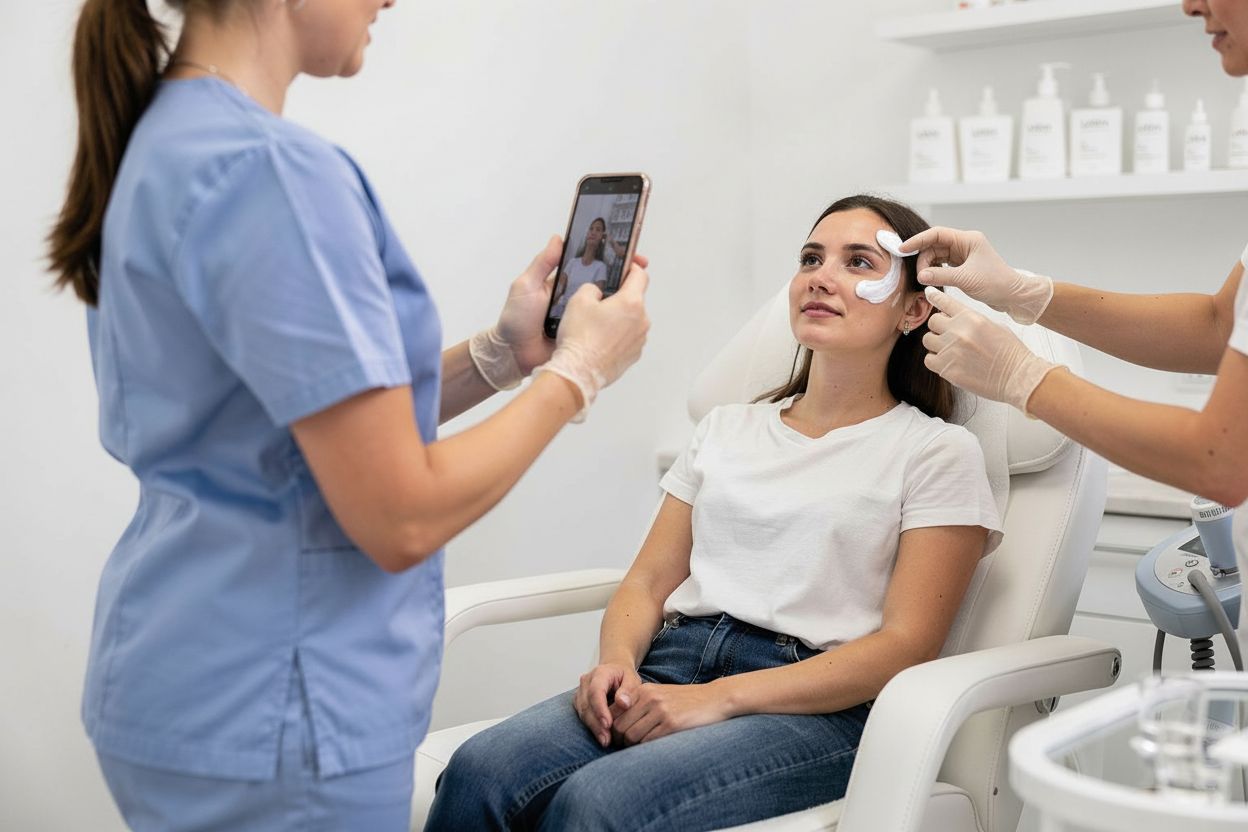Medical Spa Laws and Requirements in Alabama

Empowering Professionals at Every Stage
Portrait offers strategic expertise to help you make informed decisions and achieve long-term success.
Book Intro CallWhile Alabama law doesn't provide a specific definition for a medical spa, it does classify popular services like neurotoxin injections, dermal fillers, and laser procedures as medical treatments. Understanding these distinctions is critical for compliance, and this guide outlines the key Alabama medspa laws you need to know for operating your clinic in the state.
How Medical Spa Laws Work in Alabama
In Alabama, a medical spa is defined not by a specific statute but by the medical-grade services it provides, distinguishing it from a traditional day spa. Procedures like laser treatments, IV therapies, and cosmetic injections are considered the practice of medicine, which is why med spas are regulated differently. This classification exists to protect patient safety and establishes the specific medical spa requirements Alabama clinics must follow.
The primary governing body for medical spa laws in Alabama is the Alabama Board of Medical Examiners, which sets the rules for medical procedures and physician oversight. While the Alabama Board of Nursing and the Alabama Cosmetology Board license professionals who may perform delegated tasks, the Board of Medical Examiners dictates the necessary supervision. Understanding these intersecting med spa regulations is fundamental for maintaining compliance.
Medical Spa Requirements in Alabama
Understanding the key Medical Spa Requirements in Alabama is essential for your clinic's compliance and growth. The state’s approach to med spa regulations addresses who can own a med spa, practitioner qualifications, and supervision for specific treatments like injections and laser procedures. While ownership is flexible, a licensed physician must act as medical director and directly oversee all medical services, with strict training and protocol requirements for any delegated tasks. Adhering to these rules is the cornerstone of med spa compliance in the state.
Medical Spa Ownership & Business Structure Requirements in Alabama
Alabama's medical spa ownership laws are quite flexible because the state does not enforce the Corporate Practice of Medicine (CPOM) doctrine, meaning non-physicians can own a clinic. Consequently, complex structures like a Management Services Organization (MSO) are not required for partnership, and the state’s med spa regulations do not mandate a specific business entity type. This provides owners with more freedom in deciding who can open a med spa and how to structure the business.
However, a key part of the medical spa requirements in Alabama is that every clinic must designate a licensed physician as its medical director. This physician is responsible for all clinical operations, including creating written protocols for procedures like IV therapy and laser treatments. They must also actively supervise delegated tasks and register with the Board of Medical Examiners to ensure full med spa compliance.
Facility, Licensing, and Compliance Requirements in Alabama
While there is no single “medical spa license” in Alabama, the state’s med spa regulations require physicians performing laser and light-based procedures to register with the Board of Medical Examiners. This registration must be completed annually, and you must notify the board of any new facility locations where these services are offered. Adhering to these registration rules is a foundational part of your med spa compliance strategy.
For facility operations, all clinics using lasers must follow OSHA safety standards and ensure equipment is properly calibrated according to manufacturer specifications. Although HIPAA is not explicitly mentioned in the med spa regulations, the requirement to maintain detailed patient records means all your documentation must comply with federal privacy laws. These medical spa requirements in Alabama are designed to ensure both patient and staff safety.
According to the Board of Medical Examiners, your patient charts must include intake forms, signed consent, treatment notes, and follow-up instructions. The current rules do not specify insurance or advertising mandates for spas in Alabama. However, securing malpractice and general liability insurance is a standard practice for protecting your business and achieving full med spa compliance.
Who Can Perform Medical Spa Procedures in Alabama?
In Alabama, the line between cosmetic and medical is clear: any procedure affecting living tissue is the practice of medicine. This includes popular services like microneedling and treatments governed by the state's laser regulations Alabama and IV hydration law Alabama. Consequently, all such services must be performed by or under the supervision of a licensed physician to meet the state's medical spa requirements Alabama.
Licensed physicians can delegate certain non-ablative procedures to two tiers of providers. Level 1 Delegates include Physician Assistants (PAs), Certified Registered Nurse Practitioners (CRNPs), and Registered Nurses (RNs). Level 2 Delegates consist of Licensed Practical Nurses (LPNs), medical assistants, aestheticians, and cosmetologists.
When determining who can inject Botox in Alabama, the state considers it a medical treatment requiring physician oversight. According to the med spa regulations, Level 2 delegates must always have on-site physician supervision. Level 1 delegates may perform tasks with on-site or, in certain cases, remote supervision, though the physician remains legally responsible.
To ensure med spa compliance, delegates must complete at least 40 hours of initial training covering theory, safety, and board rules. They must also fulfill annual continuing education and minimum procedure requirements to remain qualified. These strict training rules are a key part of the medical spa laws in Alabama.
Laser & Energy Device Regulations in Alabama
The aesthetic laser laws Alabama has in place are broad, covering any device that affects living tissue, including lasers, IPL, and radiofrequency microneedling. According to the state's med spa regulations, using these devices is considered the practice of medicine, requiring strict physician oversight. Clinics offering these services must comply with the updated rules, which had a final compliance deadline of July 17, 2024.
Only physicians may perform ablative procedures, but they can delegate non-ablative treatments to two tiers of providers: Level 1 (RNs, PAs, CRNPs) and Level 2 (LPNs, MAs, aestheticians). The medical spa requirements Alabama enforces include 40 hours of initial training for delegates and 30 hours for physicians, plus device-specific instruction and continuing education. To ensure med spa compliance, physicians must also register with the Board of Medical Examiners before offering these services.
Supervision rules vary by delegate level; Level 2 delegates always require on-site physician supervision, while Level 1 delegates may work under remote supervision in certain situations. A critical component of the medical spa laws in Alabama is the mandatory reporting of serious adverse events—such as a third-degree dermal injury or hospitalization—to the Board within three business days.
Medical Spa Enforcement, Penalties & Risk Management in Alabama
Failing to adhere to the Medical Spa Laws in Alabama carries significant risks. The Alabama Board of Medical Examiners actively enforces its rules to protect public safety, and non-compliance can lead to serious consequences for your business. Understanding the common pitfalls and enforcement actions is the first step toward building a resilient clinic. Many violations of the state’s med spa regulations stem from a few common mistakes, such as improper delegation of medical tasks, allowing unlicensed individuals to perform procedures, or making false claims in advertising.
When violations are discovered, the penalties can be severe. Enforcement actions range from cease-and-desist orders that halt your operations to substantial fines and professional discipline from the board, which can jeopardize a practitioner's license. For all spas in Alabama, proactive risk management is the best defense against these outcomes. Here are some practical steps for maintaining med spa compliance:
- Regular Compliance Audits. Conduct internal reviews of your protocols, documentation, and procedures to identify potential issues before they become problems.
- Comprehensive Staff Training. Go beyond initial onboarding by providing continuous education on the latest Medical Spa Requirements Alabama, delegation rules, and safety protocols.
- Meticulous Documentation. Maintain detailed records for every patient, including signed consent forms, treatment notes, and clear follow-up instructions, to demonstrate a consistent standard of care.
Stay Compliant with Portrait Care in Alabama
Staying compliant in Alabama means understanding the state's specific approach to medical spa regulation. This includes appointing a licensed physician as your medical director, adhering to strict delegation and supervision protocols for all medical procedures, and meeting the Board of Medical Examiners' requirements for training and registration.
Please remember, this guide is for informational purposes and should not be taken as legal advice. We strongly recommend consulting with a qualified healthcare attorney to address your specific circumstances.
As you build your practice, our resources can help guide you. You can learn more about opening a compliant med spa and see how our all-in-one platform provides the tools for operational excellence. To see how Portrait Care can support your clinic’s growth and compliance, schedule a demo with us today.
One Platform.
Everything You Need.
Everything You Need.
Portrait combines the technology, support, and savings to run and scale your modern medical wellness business.
Book Intro Call
Stay Connected with Portrait Care
Subscribe to our email list and receive the latest insights, updates, and exclusive content delivered straight to your inbox.




![Who Can Own a Medical Spa? [State by State Guide]](https://cdn.prod.website-files.com/67981e0672f9e49c5b9cb890/69869b11472946b6ec9fe1f0_1770427418079.jpeg)
